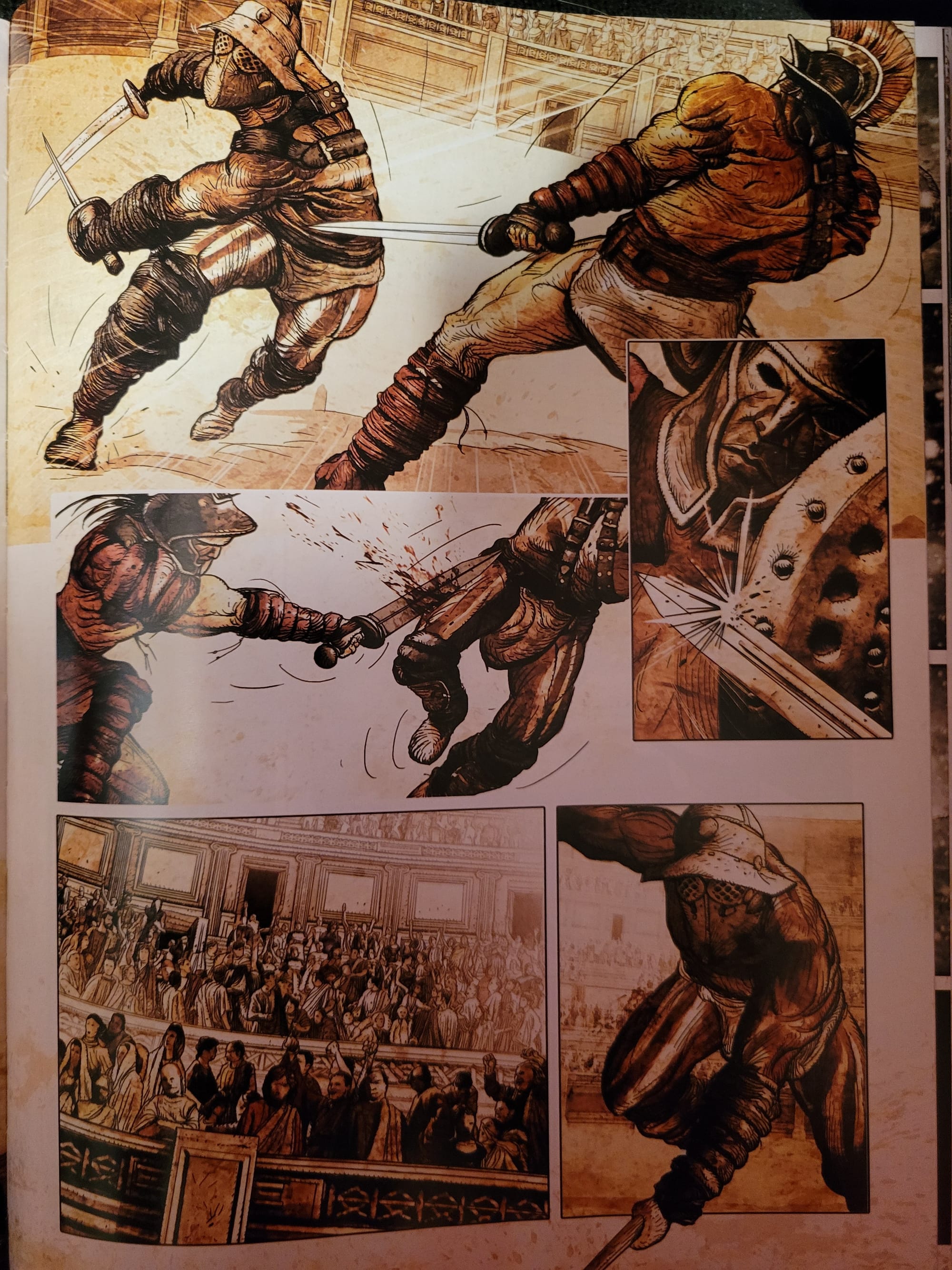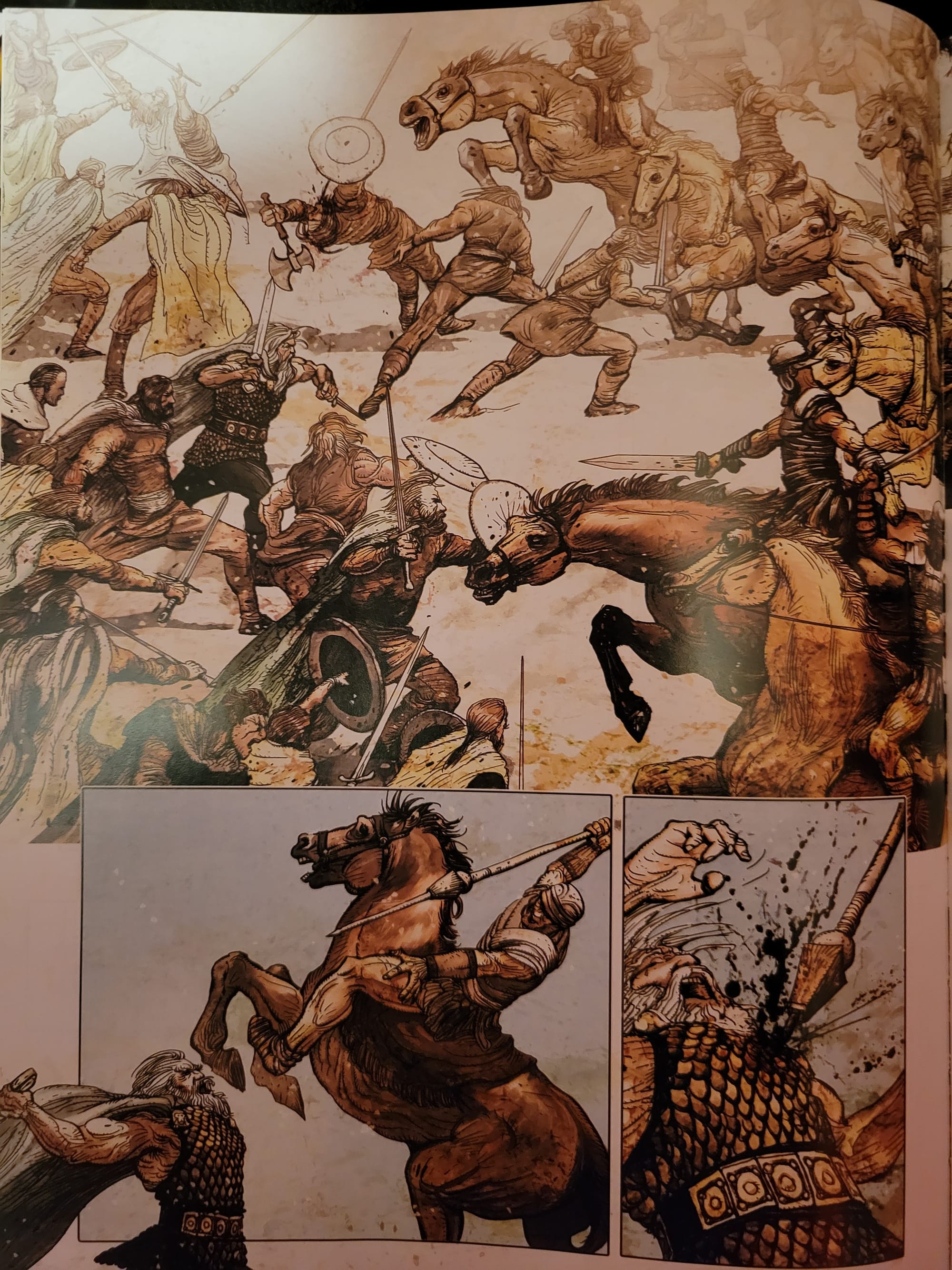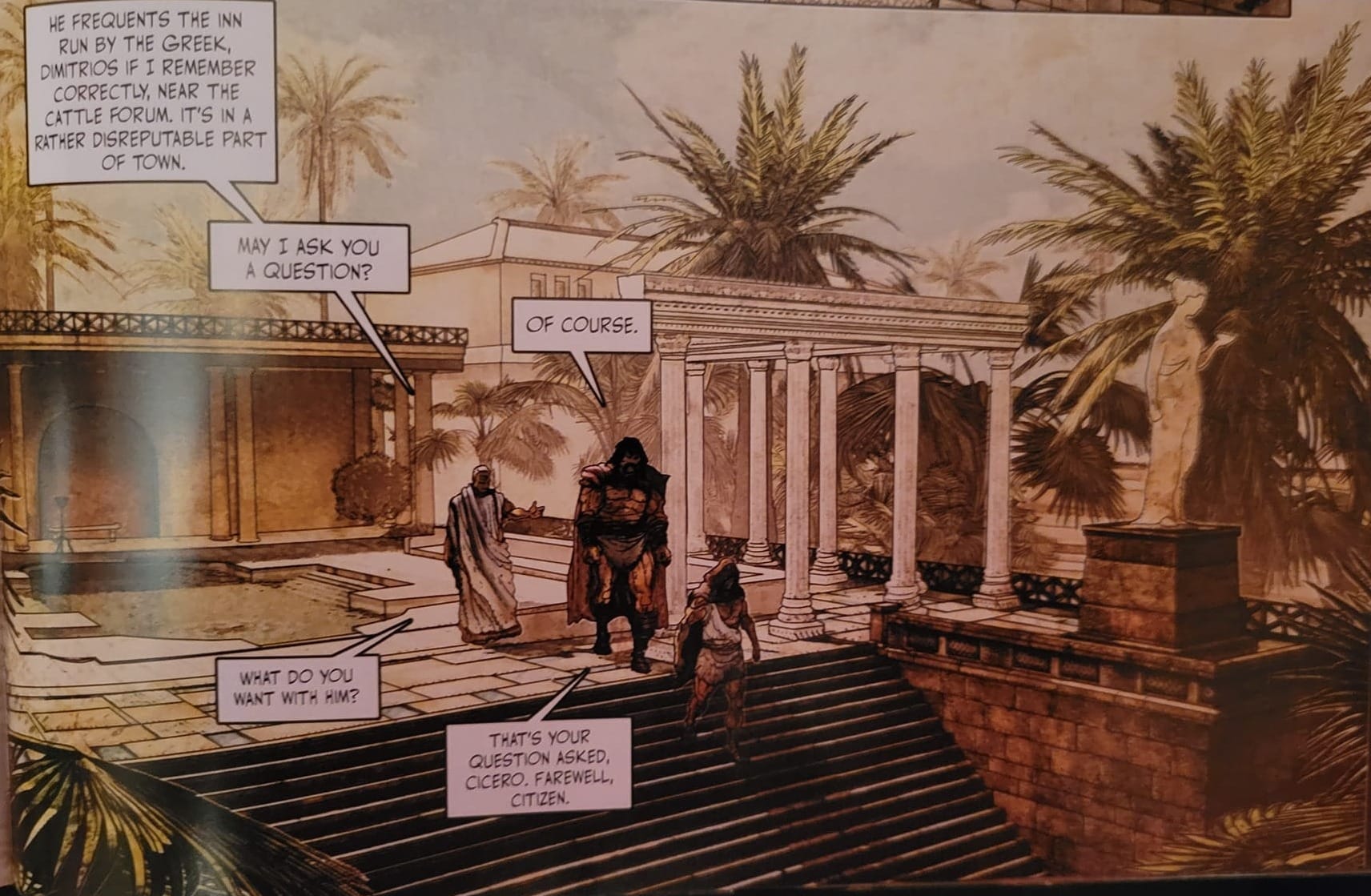Rome is eternal. And just as the Roman Empire has been immortalized, so too has its favorite son, Caesar. But behind every great man, there are those whose actions helped them achieve greatness. Those who acted in the shadows, their names and deeds lost to time despite what their efforts wrought. Those like Marcus Coax, the fictional protagonist of an epic tale of the final days of the Roman Republic and the rise of Julius Caesar.
*Spoilers ahead for Caesar’s Spy Vol. 1*
Our story begins with a lone Gaul warrior named Coax seemingly stumbling upon a Helvetii tribe just in time to save them from a group of Germanic warriors intent on ambushing them. After a brief but bloody battle, Coax and the Helvetti emerge victorious, but the threat of the Germanic armies is far from over. As both thanks and for counsel regarding the impending threat, the Helvetti bring Coax back to their village, where he advises them to leave their home or else face certain destruction. After some debate the Helvetii leaders agree to heed the warrior’s words. However, things don’t go as planned, at least not as far as Coax and the Helvetii are aware. When they reach the Roman camp, the Helvetii are slaughtered, with those managing to survive the unexpected attack being captured to be sold into slavery.



Though outraged at the betrayal, Coax doesn’t have the luxury of being able to dwell on his anger for long. Caesar has need of him, and whatever he might think of Rome, Coax is loyal to Caesar, for a myriad of reasons that are revealed as the story continues. And so, Coax sets out to do as Caesar—and by extension, Rome— requires.
Written by Jean-Pierre Pécau and illustrated by Max Von Fafner, Caesar’s Spy is a thrilling tale that takes readers through a fictional account of the tumultuous period that led to the death of Rome’s republic and the rise of the empire, shown through the eyes of the titular spy. Drawing from equal parts history and fiction, the story weaves its way through the era’s real world events at a break-neck pace that encapsulates the urgency with which Coax must act to fulfill Caesar’s wishes while also pursuing his own goals.

Adding to the story is the fact that Pécau isn’t afraid to take more than a few creative liberties. For while the story does ground itself in reality, it also adds some things to give our titular spy more personal stakes in the outcome. After all, though the Gaul is loyal to Caesar, Coax ultimately couldn’t care less about Rome. So why then does he continue to fight for its fate even after Caesar frees him? What villain could await him that would provide a satisfying finale to this grand tale, their efforts subtly pushing an already cracking Roman society to break? The answer is given almost from the very beginning, though I won’t spoil it here.
Fafner’s artwork throughout the book is phenomenal. The sheer amount of detail put into every single panel was astounding, creating one of the most beautiful comics I’ve read in a while. Backgrounds are richly vibrant, even in smaller panels, and every character presented feels unique (even if almost every male character is absolutely, absurdly ripped regardless of age and most women have the figures of models). The fight scenes feel alive and tense, whether that be Coax facing off against a single foe or battles involving multiple people. Every character is incredibly expressive, allowing even the panels containing no dialogue to speak just as loudly as those that do.
While the story is as compelling as it is fun, it’s admittedly not without its flaws. Characters both real and fictional are introduced in quick succession, making it difficult to keep up with them as Coax rushes about fulfilling Caesar’s will. As a result of this, I found it difficult to form much of an emotional attachment to most of the characters. Even in regard to Coax, I found myself more intrigued by the outcome of the overall story than I was by his character. That’s not to say the characters are poorly written, as those that stick around for more than a scene do feel unique and complete. But overall, few of the characters were given enough background to make them truly connect with me.

The ending felt a bit abrupt to me, though that could be that it is merely capturing the ending to Coax’s part of the story rather than the full conflict engulfing this integral moment in Rome’s history. When viewed through that context, it plays out in a way that’s quite satisfying. While I wouldn’t have minded a bit more build up to it, the conclusion was exactly what this particular story needed, wrapping Coax’s story up neatly.
Overall, the story is fun for action lovers and those intrigued by Roman history alike. While it does take its fair share of creative liberties, the heart of the story is based in real events, providing an added layer of depth to Coax’s epic story. Fafner’s artwork is stunning, filled with such detail I found myself stopping to admire it numerous times as I read through the book. While I wish certain events had been built up a bit more and characters given a bit more personality, Caesar’s Spy is ultimately a fun story that is well worth a read.
Caesar’s Spy Vol. 1 is available now from Titan Comics.
Caesar's Spy Vol. 1
Good
A fast-paced tale set in a pivotal moment in human history, Caesar’s Spy is sure to be loved by action fans and history lovers alike. With stunning artwork complementing a tightly written story, you’ll be hard-pressed to set it down once you start.
Pros
- Time period provides an exciting setting
- Fafner’s artwork is gorgeously detailed
Cons
- Few characters are memorable
- Finale could have benefited from a bit more buildup
This review is based on a retail copy provided by the publisher.





















